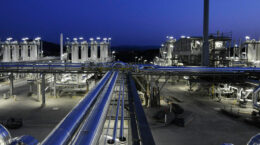At BASF, we strive to lead the world’s transition toward a more sustainable future. For our Catalysts division, that means enabling a net-zero future for e-mobility. With several recent announcements related to the expansion of our electric vehicle battery recycling capacity, that future is increasingly within reach.
New sites in Germany lay the foundation for circularity in Europe
Most recently, our team announced plans to build a new, commercial-scale battery recycling black mass plant in Schwarzheide, Germany. The production of black mass is an essential early step in the battery recycling process. When a battery reaches its end of life, significant value can be created through recycling, including collecting, dismantling, and shredding. The shredded material is then processed to produce a material called black mass, which contains high amounts of the key metals used to produce cathode active materials (CAM) for lithium-ion batteries, including lithium, nickel, cobalt, and manganese. In a next step, the critical metals can be extracted from the black mass in a refinery.

Prototype of Schwarzheide plant
Alongside the new black mass plant in Schwarzheide, we’ve also broken ground on a new battery recycling prototype plant, where we’ll develop operational procedures and optimize technology to deliver superior returns of lithium, nickel, cobalt, and manganese from the produced black mass. Co-located with our CAM production facility, the work done at the future prototype plant will be used for a commercial recycling plant (refinery) which we plan for mid-decade. These major investments in Schwarzheide are just two of the early steps we are taking toward the circular, net-zero future we envision for e-mobility.
Our plan: Build REGIONAL value chains, to generate GLOBAL impact
Beyond Europe, we are making strides to increase our recycling capacity across our global business:

In North America: BASF recently secured land for a future cathode active materials and recycling site in Bécancour, Quebec, Canada, as part of our commitment to support North American automakers in their transition to e-mobility. The future site in Quebec is a major contribution toward creating a full closed-loop value chain in the region, helping ensure a reliable and resilient supply of battery materials.

In Asia: We are also well on our way toward creating a circular value chain in China. BASF Shanshan Battery Materials, is a partner in Fujian Evergreen New Energy, which recycles end-of-life lithium-ion batteries and battery manufacturing scrap, as well as producing precursor cathode active materials (PCAMs). Fujian Evergreen New Energy is planning to expand to meet the growing demand of customers for recycling solutions.
Battery recycling’s role in achieving our net-zero goal
For the transition to e-mobility to truly contribute to a more sustainable future, we must neutralize the carbon footprint of electric vehicles. As a leader in this industry, we believe our global footprint and best-in-class battery recycling capabilities position us to lead our industry to that goal. And by creating regional, closed-loop value chains in all major regions, our customers and partners benefit from the resiliency and local expertise that they require in what is an increasingly dynamic industry landscape.
With each strategic investment we make to increase our battery recycling capabilities, our business takes another step toward realizing a net-zero future for e-mobility. We are proud of the work we have achieved so far on this journey, and eagerly look forward to the progress yet to come.





